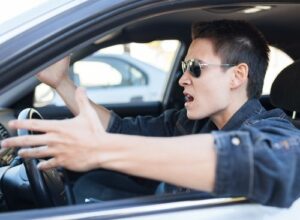
Aggressive driving is unsafe behavior that puts everyone sharing South Carolina roads at risk and leads to serious accidents. Aggressive driving involves deliberate acts such as speeding, tailgating, weaving lanes, running red lights, blocking other cars, and making rude gestures. When drivers become aggressive behind the wheel, they show disregard for the safety of others.
Millions of drivers engage in aggressive driving each year, according to the AAA Foundation for Traffic Safety. When aggressive driving causes accidents, the drivers should be held accountable.
Our dedicated injury attorneys at Joye Law Firm have represented many people harmed by aggressive drivers. If you have been injured in a collision caused by an aggressive driver in South Carolina, we’d like to hear from you. You may be entitled to compensation for your medical bills and other losses.
Why Do People Drive Aggressively?
There are many factors that may contribute to road rage or aggressive driving, including:
- Personality – According to data from the Society for Risk Analysis, people with certain personality types are more prone to aggressive driving. Those with impulsive, angry personalities engage in aggressive driving behavior more often.
- Intense emotions – When people are overwhelmed by strong emotions like anger or frustration, they are more likely to drive in an aggressive manner.
- Environmental factors – In some cases, environmental factors such as traffic congestion, heat, or a long commute can lead to aggressive driving.
- Drugs or alcohol – If a person is intoxicated by alcohol, their normal inhibitions may be impaired, making aggressive behaviors more likely. Certain drugs, such as stimulants, hallucinogens, or steroids, can also make users more aggressive.
Aggressive Driving in South Carolina
Aggressive driving is certainly a problem in South Carolina. Reckless driving is considered a misdemeanor criminal offense, and several other behaviors that are commonly associated with aggressive driving are illegal.
Under South Carolina law, reckless driving is defined as driving with “willful or wanton” disregard for the safety of other people or their property. Unsafe driving behaviors that qualify as reckless include racing on public streets or passing others in no-passing zones. Penalties for reckless driving charges can include points against your license, fines, license suspension, and even jail time.
Other aggressive driving behaviors that are against the law in South Carolina include things like speeding, tailgating, and lane weaving.
What to Do Around Aggressive Drivers
The chances are that if you spend much time driving in South Carolina, then you will encounter some drivers behaving aggressively from time to time.
If you end up sharing the road with an aggressive driver, you can take the following steps to stay safe:
- Do not attempt to confront the aggressive driver.
- Try to avoid driving near the aggressive driver.
- Avoid making eye contact with the aggressive driver.
- Ignore any gestures or attempted verbal communication from the driver.
- Call 911 or *47 (*HP) in South Carolina as soon as it is safe to do so and report the aggressive driver, noting the vehicle make and model, color, license plate, and direction of travel, if possible.
- If you witness an accident caused by an aggressive driver, pull over to a safe location nearby and provide a witness statement to the police.
Types of Aggressive Driving
Aggressive driving refers to dangerous behaviors that put everyone on the road at risk. Common types of aggressive driving behaviors include:
- Exceeding posted speed limits or driving too fast for conditions
- Unsafe passing, such as passing on blind curves
- Illegal passing, such as crossing a double yellow line to pass
- Failure to yield the right of way to pedestrians, cyclists, or other motorists
- Running red lights, stop signs, or other traffic control devices
- Tailgating or following others too closely in traffic
- Weaving in and out of traffic or driving along road shoulders
- Street racing
- Cutting in front of other vehicles too closely
- Passing a school bus while it is stopped
Dangers of Aggressive Driving
 Aggressive driving is associated with a significant number of motor vehicle accidents and accident-related injuries and deaths. In most cases, the consequences of aggressive driving accidents are entirely preventable.
Aggressive driving is associated with a significant number of motor vehicle accidents and accident-related injuries and deaths. In most cases, the consequences of aggressive driving accidents are entirely preventable.
In some cases, aggressive driving behaviors can lead to road rage, which involves intentionally violent driving acts. Some drivers with road rage may go so far as to use their vehicles to strike other motorists or attempt to run another vehicle off the road. These frightening behaviors can lead to serious and sometimes fatal accidents.
What We Can Do About Aggressive Driving
On an individual level, you can do your part to curb aggressive driving accidents by:
- Taking a deep breath – If you are in a stressful traffic situation or start to feel angry with another driver, it can help to take a few calming breaths. Deep, regular breathing can lower your heart rate, clear your head, and help you relax.
- Keeping in mind that other drivers are people, too – When you’re isolated in your own vehicle, it can be easy to forget the humanity of other drivers around you. Do your best to remember that others on the road have lives of their own and everyone makes mistakes.
- Resisting the urge to retaliate – Many aggressive driving incidents occur as a result of unnecessary escalation. If a driver is behaving irresponsibly on the road, don’t stoop to their level by retaliating and escalating the situation.
Contact an Aggressive Driving Accident Lawyer Today
If you were injured in a South Carolina aggressive driving accident, you may be entitled to seek compensation for your losses. The attorneys at Joye Law Firm are ready to help. With more than 50 years of experience and millions of dollars in compensation secured for our clients, we know what it takes to help you build a persuasive case for compensation injuries caused by an aggressive driver.
To learn more about how we can help you hold an aggressive driver accountable and seek the money you need to get back on your feet, contact us today for a free initial consultation.







































